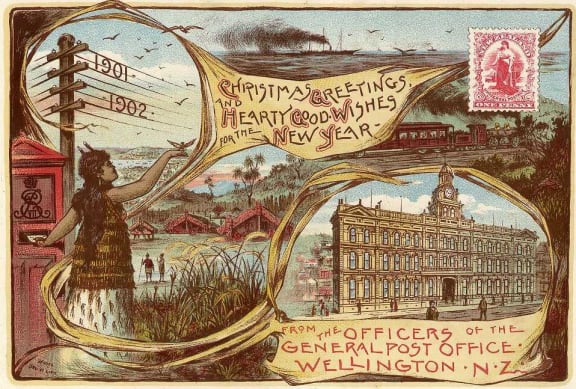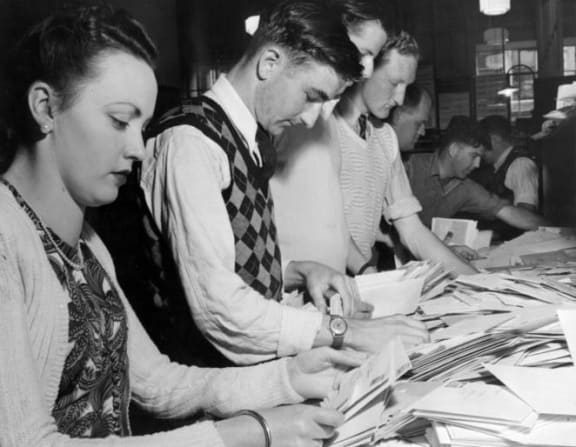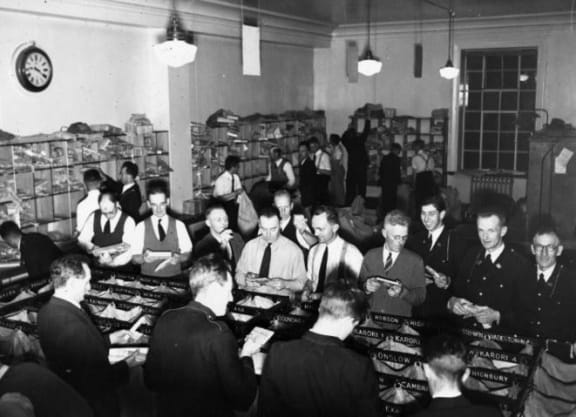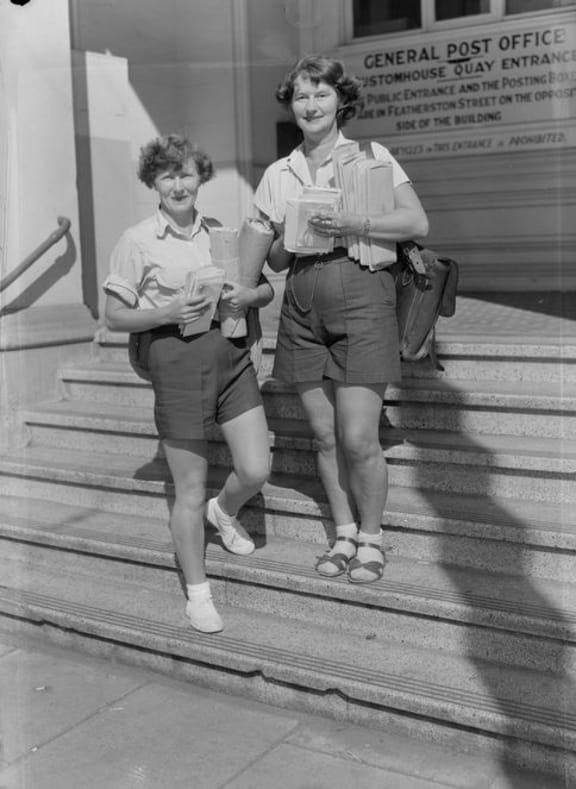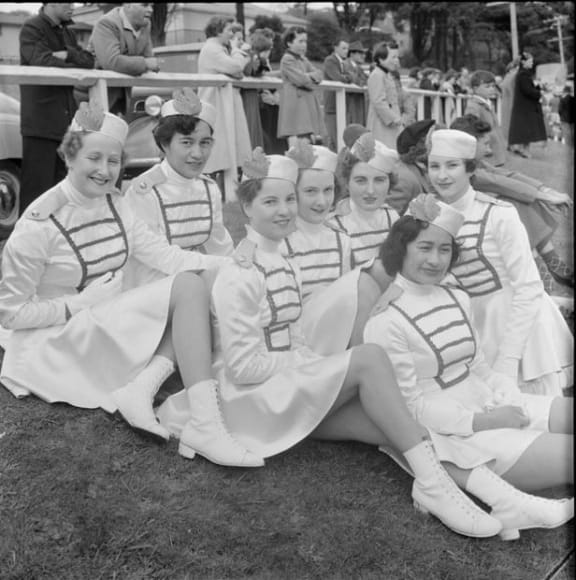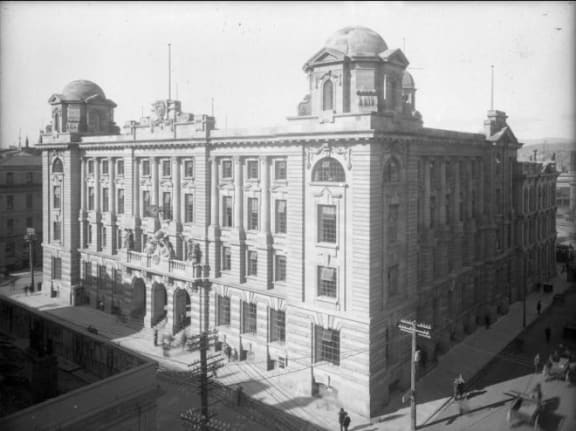Ngā Taonga sound archives - With the possibility the remaining 79 Post Shops will close, Ngā Taonga's Sarah Johnston dredges up recordings of the mid-century Post Office - employer of 16,000 staff - and its decline during the 1980s ...
New Zealand Post has indicated it wants to shut its last 79 Post Shops, swapping them for counters in supermarkets and pharmacies.
That's a long way to fall for the Post Office of 1940s New Zealand, a government department which employed about 16,000 people, had nearly 2000 branches, and had its own bands, sports teams and an official marching girls team.
"The first half, really, of the 20th century in rural New Zealand the hub of the community was the local post office, the school, the pub. In a lot of rural places that was pretty much it," Johnston says.
"You had the telephone services controlled by the post office. It’s where you sent your telegrams, telegraphs, you enrolled to vote, you got your marriage licence, did you banking, picked up your pension as well as stamps and letters.
"It was a huge nationwide organisation ... they were the face of central government really."
"The post master could even marry you - could perform a marriage ceremony - so they were really involved in people's lives."
First Cut: 'Under the Clock' 1949 radio documentary
This 1949 radio documentary looked at all the different aspects of the organisation, where staff were able to learn a huge range of trades and roles.
"It’s called under the clock, because the old chief post office ... in Wellington, huge big stone building - had this great big clock and people used to meet under the clock," says Johnston.
They had banking and telephone exchange workers, telegraphists learning Morse code, engineers working on maintaining the telephone system.
They even had workshops that built everything from letter boxes to mail vans, and even rubber workers, who produced rubber stamps for marking all those letters.
Staff learnt all these trades at the Post Office Training Centre in Trentham in the Hutt Valley, near Wellington, which had been the site of the military camp during the war:
Narrator: "Twenty miles from Wellington, at Trentham, the sprawling hutments military camp is now put to this new use.
"Most buildings have been converted to tidy dining rooms and recreation halls, and lecture rooms where the characteristic sounds of the post office are a metallic emphasis to points driven home by keen and efficient lecturers.
"Post office procedure ..."
Instructor: "Now, to summarise, a letter of credit is available to the holder of a Post Office savings bank account."
Narrator: "Telegraph sending and receiving ..."
[Tapping sound of telegraph machines]
Narrator: "Mechanical theory ..."
Instructor: "It provides independent calling for each of the ten lines which may be connected via cord circuit feed to any other line.
Narrator: "Telephone exchange instructions ..."
Instructor: "Common sense and initiative are as necessary in the successful completion of calls as technically correct operating.
Narrator: "Radio signal training ..."
[Sound of Morse code signalling]
Narrator: "These buildings, which once echoed the marching feet of military formations are now known as Trentham centre.
"Intensity marks the manner of the whole school. Pupils are propelled through phase after phase of training, given the best instruction available. In the end, if they can take it, they have the opportunity to reach the top of their profession.
"From the training school, these men and women return to their normal routine: of counterwork; line laying; punching telegraph keys; and checking telegraphs."
Second Cut: Post office closures and redundancies, Morning Report 1988
By the 1980s many rural communities were shrinking and smaller post offices had become uneconomic.
During the restructuring of the 1980s, a review was ordered and it was recommended that the Post Office be divided up into three state owned enterprises: The Post Office to handle letters and mailing, Telecom to handle phone services, and Post Bank to handle the bank operations.
Over 400 post offices closed their doors and over 500 staff were made redundant.
Johnston notes there were a huge number of petitions - including a man from Mapua going on hunger strike on the steps of Parliament, and one person who walked from Southland to Wellington to present their petition.
Morning Report host: “The local post office will disappear from hundreds of communities around New Zealand today. At closing time tonight 432 post offices in rural and suburban areas will be history.
"Pam Corkery reports."
Corkery: "Sixteen months ago, then-Postmaster General Jonathan Hunt said no post offices would be closed.
"Today, despite campaigns by many communities, some at the 11th hour, the promise has gone the way of Mr Hunt’s job.
"In cities post offices are for rash transactions in the middle of a busy day, but in suburbs and country areas, the post office can be as social as the local pub.
"The Dunedin hill suburb of Brockville fought to save its post office - a 1000-strong petition was personally delivered to Parliament by two locals, with no success.
"For the postmistress of 10 years, Joy Batchelor, It’s been a miserable last few days."
Batchelor: "All our customers coming in and tell us how they’re going to miss us - miss us personally as well as having their banking and their stamps etcetera that they can buy from here. And we’re gonna miss them too.
"They can’t understand why they should be closed and people don’t seem to count for very much now. Unless you’re making lots of money, well, you’re down the line really."
Third Cut: Wellington Post Office Band 1954 performs 'March Victoria'
Before the cuts, post offices had their own sports teams - and rugby and hockey team photos can still be found at Alexander Turnbull library today.
There were also post office competitive marching girls teams, highland pipe bands, and brass bands.
As a tribute to the days of the post office, this third cut is of the 1954 Wellington Post Office brass band performing 'March Victoria'.
